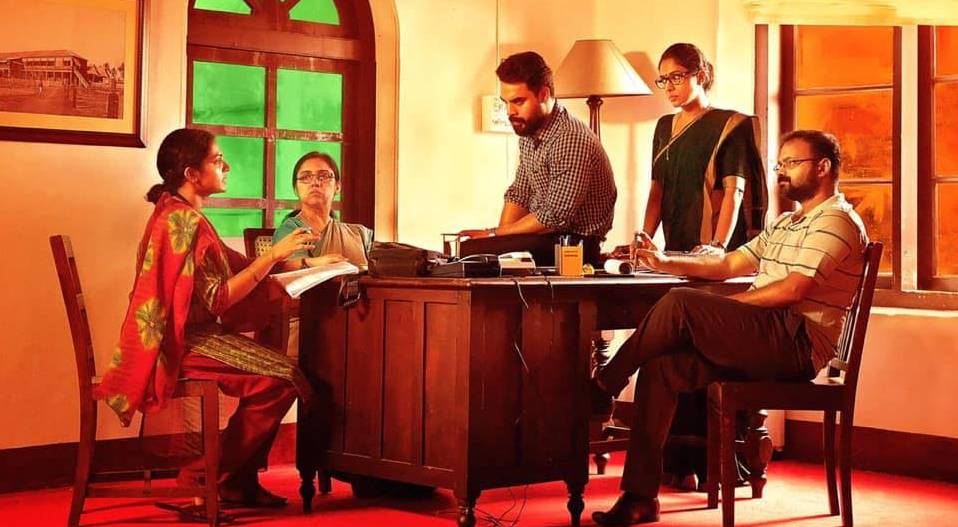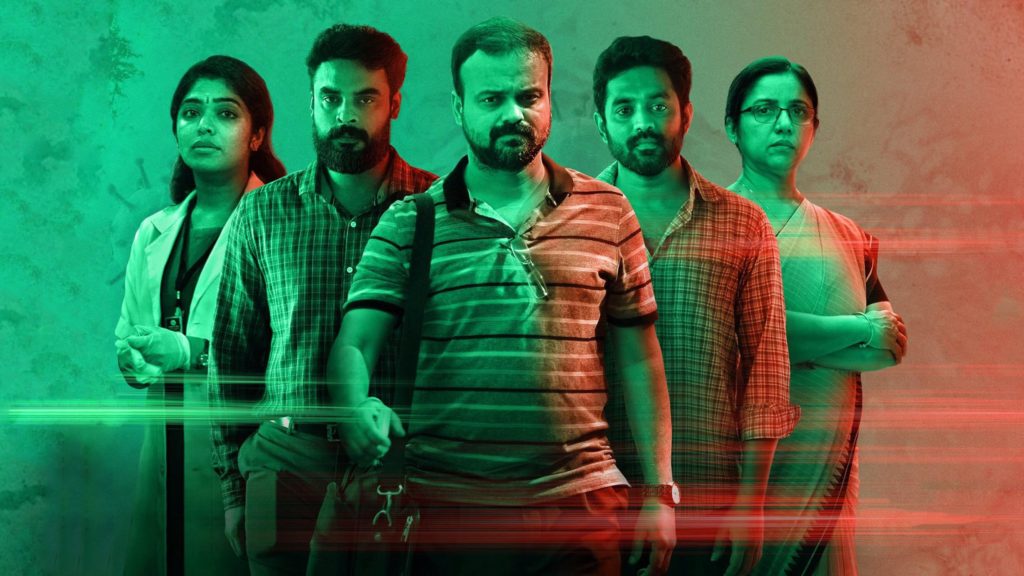
What happens when a comparatively well-equipped Indian state known for its excellence in healthcare sector gets afflicted by a deadly virus against which there is no known treatment? Director Aashiq Abu in his medical thriller Virus retreads the dark days of Nipah outbreak in Kerala which occurred in May-June 2018. Written by Muhsin Parari, Sharfu and Suhas, the film keenly analyzes the social and political implications that epidemics bring along, besides the urgency to trace their roots.
Virus kicks off in a documentary-like fashion wherein a young house surgeon Abid (Sreenath Bhasi) is shown to live his routine life – a major part of which is tending to critically ill patients in Kozhikode Medical College. He is shown to have minor altercations with his love interest Sara (Madonna Sebastian) which smartly ends with an important lesson on consent. Soon the news kicks in regarding an unidentified disease plaguing the region with the epicentre being Perambra, a small town in Kozhikode district from where the index patient Zakariya (Zakariya Mohammed) hails. Not long after, patients with similar symptoms are identified in a different town, miles away from Perambra. The rest of Virus is a spine-chilling and extremely well-penned effort to connect certain crucial dots – where did this bizarre disease originate from?
For starters, feature films anchoring on disease spread and epidemics are not the easiest ones to sit through. Aashiq Abu, as if to dull out the ominous tint of this predicament, casts a slew of A-listers from Malayalam film industry. While designing well-etched characters for each, the film also analyzes few glaring inadequacies in the healthcare sector (also the public sector, at large) – unemployment being one. Once the virus detection kicks in, the film wastes no time treading through various aftereffects of such an incidence. We see a committed doctor (Jinu Joseph) at the Government Medical College deciding to apply for a leave, fearing the disease’s communicable nature. His wife Annu (Parvathy), a second-year Community Medicine student, represents the opposite pole and eagerly joins the core team that investigates the virus spread.

As an affected health worker Akhila (Rima Kallingal) succumbs to the disease, we see an anxious nurse looking at the television news that discusses the risk factors associated with her primary vocation. In a heartbreaking scene later, the mother of the index patient expresses empathy with a lament that her son is the source of the epidemic and how everyone might hate him even after his death. The screenplay is also sprinkled with a neat dose of humour which is cleverly theme-relevant. For instance, the hilarious television debate between the Public Health Officer Smrithy Bhaskar (Poornima Indrajith) and a natural medical practitioner where the latter questions the findings on Nipah and the sanctity of modern medicine, in general.
In many ways, Virus establishes how overcoming a severe medical crisis is largely about driving a people-centric movement. There is stigma along with uncertainty and a resultant lack of support from the local public. The film also analyzes the religious sentiments of the victims’ families with the scene where Zakariya’s family expresses the desire for a ritualistic burial against the recommended electric cremation. The altercation that occurs wherein the Central Government representatives assert how Nipah outbreak is the result of a bioweapon attack is another angle that binds the film with great tension – turning Virus into a tight investigative drama in the second half. The same passage introduces new sub-plots besides addressing other criminal activities pursued by some of the victims, including currency counterfeiting and poaching. Virus binds all of its findings in a coherent, believable fashion which, at the same time, is slightly overwhelming due to the sudden outflow of information and scientific terms.
Characterization-wise, Virus plays safe (to a large extent) by basing them on the actors’ set images, which is a little underwhelming. If Asif Ali is playing the angry lover for the nth time, you also see Indrajith’s Dr Baburaj bearing familiarity with his usual temperamental screen appearances. While almost all key players of Sudani from Nigeria reappear to essay similar parts, Dileesh Pothan gets to play a cop yet again. That said, besides rendering a peculiar sense of déjà vu to its environment, none of it hampers the complex plot in any manner. Casting-wise, it was rather amusing to see the campus pals from the ‘90s Kunchacko Boban and Sudheesh, in age-appropriate roles of a virology expert and a local health inspector respectively.
One minor glitch, which also extends to the film’s finale, is Revathy’s portrayal of the Health Minister C.K. Prameela Teacher. While the actor is confident hogging prolonged still frames sans dialogues, the impact evaporates immediately as the character speaks. Soft and brimming with a housewife-like tenderness, the dubbing artist fails to induce a necessary sense of assertiveness to the beloved ‘Teacher’, a character based on Kerala’s current Health Minister K.K. Shailaja. The impact is ruined further with a generic climactic speech where her words register more like an affectionate school principal than a self-assured team leader. This is, nevertheless, compensated by a warm epilogue moment that retraces how Zakariya contracted the disease. It is unsettling and at the same time thought-worthy knowing how the man’s genuine act of kindness resulted in unforeseen consequences.
ALSO READ: ‘Trance’ review – Anwar Rasheed’s audacious film takes on the business of religion
Having said that, Virus is nothing short of a cinematic marvel, especially for Indian cinema standards and syntax. One needs to applaud Aashiq Abu for hiring almost half of the industry’s talented (and saleable) young actors and not drown them in an abyss of mediocrity (read Twenty: 20). We get no jarring musical numbers, instead, we have Sushin Syam’s thumping original score that clouds the tense weather to perfection. Rajeev Ravi’s cinematography bears a powerful tint of gloom which is further accentuated by Saiju Sreedharan’s carefully cut frames. The opening credits – even though hard to sit through – chronicles the day-to-day events in a busy medical college to a T. The dialogues though interspersed with medical terminology is simple enough for an everyman to comprehend.
Aashiq Abu, wearing the directorial hat, nails a complex narrative filled with numerous subplots and flashbacks with remarkable clarity. One must also give it to him for balancing his material in a manner that it is horrifying enough to keep you alert but also without inducing unnecessary paranoia. The central message is not of unrealistic hope either. The film celebrates the victory accomplished by a group of everyday heroes whose sole mission is to let the region go back to its routine ways. It also measures the vulnerability of the very same ordinary life, citing how no preventive methods can avert a calamity that is bound to land by. Plus, it is infinitely surprising that Virus, which runs more than 2 hours and 30 minutes without any standard elements of entertainment, is perhaps the most gripping film running in Indian screens on this date. Let’s talk about masterful filmmaking, shall we?
Rating: ★★★★

